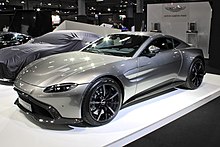Economy
England's economy is one of the largest and most dynamic in the world, with an average GDP per capita of £37,852 in 2022.[6] HM Treasury, led by the Chancellor of the Exchequer, is responsible for developing and executing the government's public finance policy and economic policy.[129] Usually regarded as a mixed market economy, it has adopted many free market principles, yet maintains an advanced social welfare infrastructure.[130]

The economy of England is the largest part of the UK's economy.[131] England is a leader in the chemical and pharmaceutical sectors and in key technical industries, particularly aerospace, the arms industry, and the software industry. London, home to the London Stock Exchange, the United Kingdom's main stock exchange and the largest in Europe, is England's financial centre, with 100 of Europe's 500 largest corporations being based there.[132] London is the largest financial centre in Europe and as of 2014 is the second largest in the world.[133]
London has also been named as the fastest growing technology hub in Europe, with England having over 100 unique tech companies with a value of $1 billion or more.[134][135] The Bank of England, founded in 1694 as private banker to the government of England and a state-owned institution since 1946, is the United Kingdom's central bank.[136] The bank has a monopoly on the issue of banknotes in England and Wales, although not in other parts of the UK. The government has devolved responsibility to the bank's Monetary Policy Committee for managing the monetary policy of the country and setting interest rates.[137]

England is highly industrialised, but since the 1970s there has been a decline in traditional heavy and manufacturing industries, and an increasing emphasis on a more service industry oriented economy.[82] Tourism has become a significant industry, attracting millions of visitors to England each year. The export part of the economy is dominated by pharmaceuticals, automotives, crude oil and petroleum from the English parts of North Sea oil along with Wytch Farm, aircraft engines and alcoholic beverages.[138] The creative industries accounted for 7 per cent GVA in 2005 and grew at an average of 6 per cent per annum between 1997 and 2005.[139]
Agriculture is intensive, highly mechanised and efficient by European standards, producing 60% of food needs with only 2% of the labour force.[140] Two-thirds of production is devoted to livestock, the remainder to arable crops.[141] The main crops that are grown are wheat, barley, oats, potatoes, and sugar beets. England retains a significant fishing industry. Its fleets bring home a variety of fish, ranging from sole to herring. England is also rich in natural resources including coal, petroleum, natural gas, tin, limestone, iron ore, salt, clay, chalk, gypsum, lead, and silica.[142]
